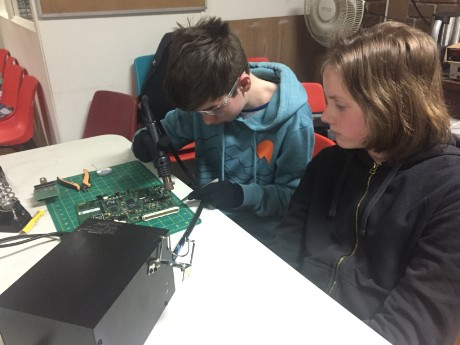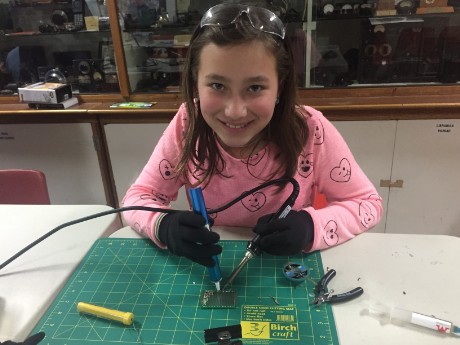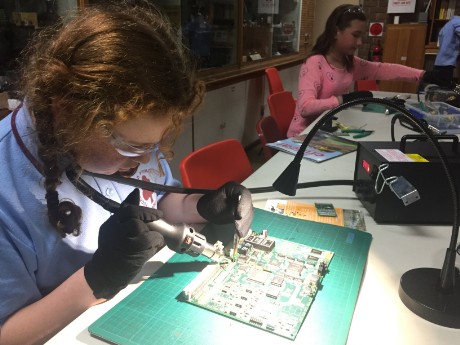News Page 3
This page contains all the latest news about school amateur radio clubs. Please contact us to add your SARC news to this page. Send us a picture and description of your SARC activities. Remember to get parental permission to publish student photographs on this site and in our newsletters.
Kids In Space
SARCNET and the Melbourne Space Program (MSP) have teamed up to get primary school kids into space. Well, maybe not actually into orbit themselves, but youngsters will certainly be getting hands-on experience and learning about the science of space satellites.
The purpose of the MSP, run by the University of Melbourne, is "to educate, engage and inspire through space activities in Australia". The University is currently working on the development of ACRUX-1, a low earth orbiting cube-sat, scheduled for launch in 2018.
The joint project is to develop an educational program for primary schools, where students will be able to "do science" with space satellites. In fact, the launch of ACRUX-1 will provide students an opportunity to be directly involved in the Melbourne Space Program - something we know they will never forget. Students will be able to track the satellite and receive telemetry data, such as solar panel voltages and temperatures. The data can be analysed to learn all sorts of interesting things about the sun, the earth, satellites and their orbits. Even just knowing the orbital period and mass of a satellite can be used to calculate the mass of the earth!
The first part of the project is to develop a simple, low-cost, satellite tracking and receiving station, which can be easily set up and used by primary school students. The solution will involve a cross-polarised antenna, a mini satellite-antenna rotator, an SDR receiver and a Raspberry Pi computer. Development is well underway. If you or your club want to get involved in this exciting program please contact SARCNET.

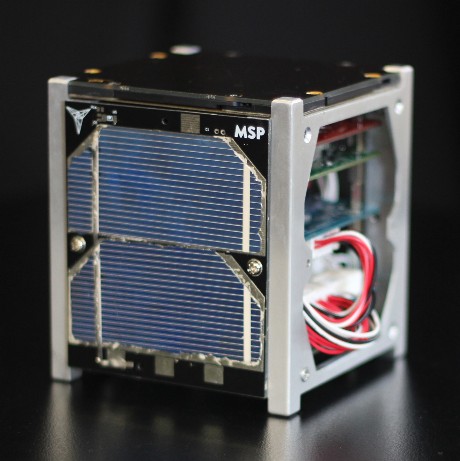
SARCNET @ St. Kevin's Community Day
It was a fun day at St. Kevin's Primary School. Organised by Principal Michael Day with the school staff and the community all pitching in. There were many activities including a moving Remembrance Day ceremony. SARCNET provided electronics prototyping, Arduino and soldering workshops to an enthusiastic group of students. The SARC kids helped out with demonstrations of their own. Even the Owls In The Library put on a flashing, spinning, beeping Arduino Microcontroller demo.
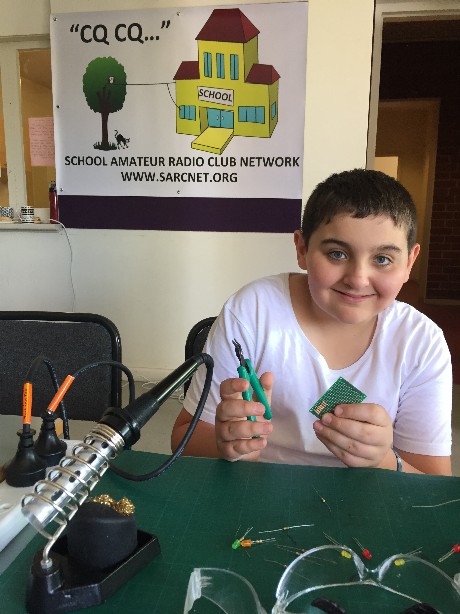
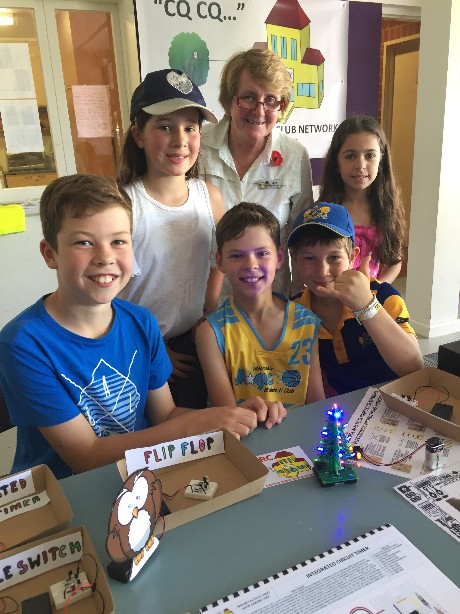
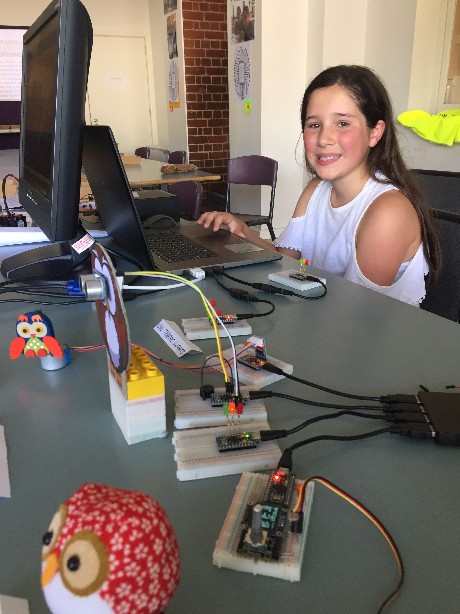
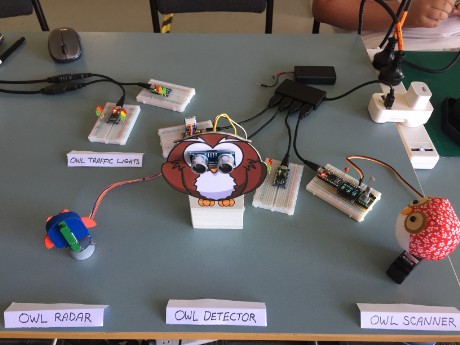
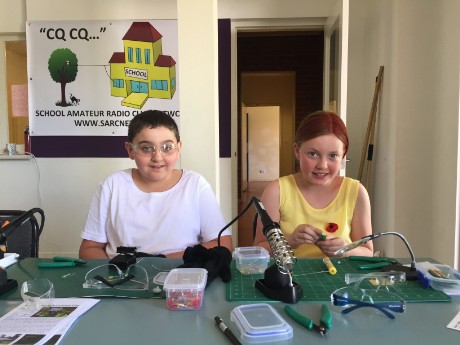
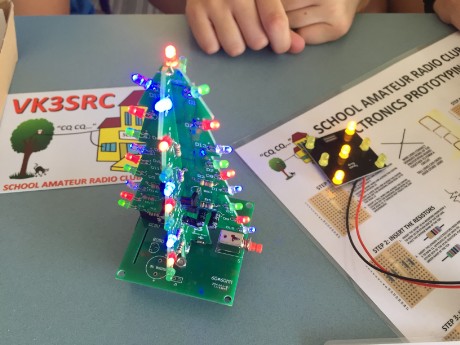
SARCNET International Arduino Challenge
The School Amateur Radio Club Network, Arduino Challenge is well underway across three continents: USA, UK and Australia. Students as young as 5 with little or no introduction to microcontroller programming in "C" start with the Arduino “blink” sketch and set about hacking* it to make it control more LEDs and in weird and wonderful ways.
(*) Hacking - Definition: "To modify (a computer program or electronic device) or write (a program) in a skillful or clever way"
Here at Moorabbin and District Radio Club in Melbourne, Australia, the boys, Matthew and Edward are off to a head start with their “Railway Crossing Lights” and “Traffic Lights”. Ethan has written over a hundred lines of code to make a single 7-segment LED display count from 0 to 9. The girls are catching up fast though: Emilka is already soldering LEDs as fast as she can for her "Makeup Mirror Lights". Jessica has made “Disco Lights for her Num Noms” (whatever they are) and and Abigail wants to do a “Hypnotic Owl”. Where they come up with these ideas no one really knows. But nothing can dampen their enthusiasm!
There were some tense moments tonight when Ed added 100 zeros to his delay function just to see what would happen (well not very much really) and later shrieks of “I did it!” from Matthew when another LED magically sprang into life. Ethan discovered that a single function to turn off ALL his LED segments saved him over 50 lines of code (D'oh). Emilka made her program flash 14 LEDs in a sequence and now plans to make the sequence change!
If you get the impression these kids are pretty good with technology, wait till you see their professional video presentations as they document their journey of discovery. Better still, don’t just sit back and watch us. If you know some youngsters who want to get into Arduino, why not get them started too. The SARCNET International Arduino Challenge is open to everyone! If you are interested to learn how, just contact us: SARCNET uses Amateur Radio to promote STEM learning in primary schools. We provide free, lunchtime on-air experiences, together with electronics, soldering and microcontroller workshops. What could be more fun?


SARCNET goes Lead-Free!
Old habits die hard, but after 50 years of hand soldering with industry-standard tin/lead solder, we have now turned over a new leaf and made a strong commitment to the environment: No lead!
Soldering with lead-free solder requires the use of flux and modified expectations with regard to the shiny finish of properly soldered joints. Good lead-free solder joints do appear a little grey, but they should not be rough. The soldering iron temperature has not changed, despite the increased melting point of lead-free solder. Lead-free soldering flux is used, sparingly, to obtain better penetration into plated through holes and underneath SMT components as well as an improved finish. A small DC muffin fan is used to disperse any additional fumes. Soldering always takes place in a well ventilated area. Eye protection and heat-resistant gloves are mandatory safety equipment. A short safety briefing before each class is conducted to remind children of the potential hazards. We could not be happier with the results and the satisfaction of protecting the environment. Shown in the photos is SARCNET student Jessica, who simply loves soldering, and a comparison of tin/lead soldering on the left and lead-free soldering on the right: Almost no difference!
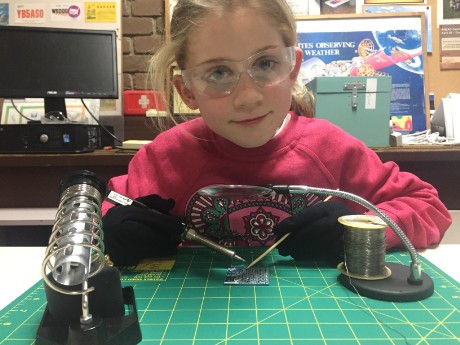
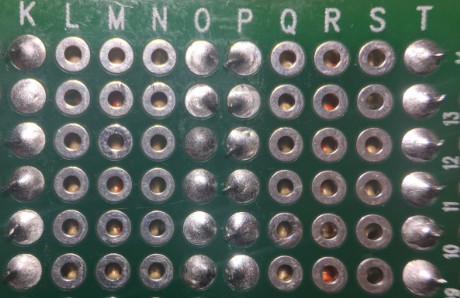
SARCNET @ St. Kevin's Primary School
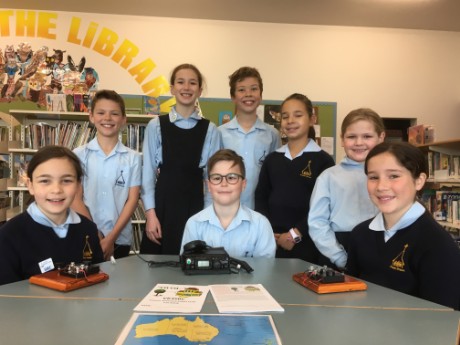
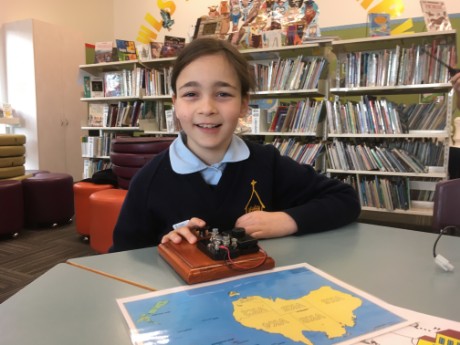
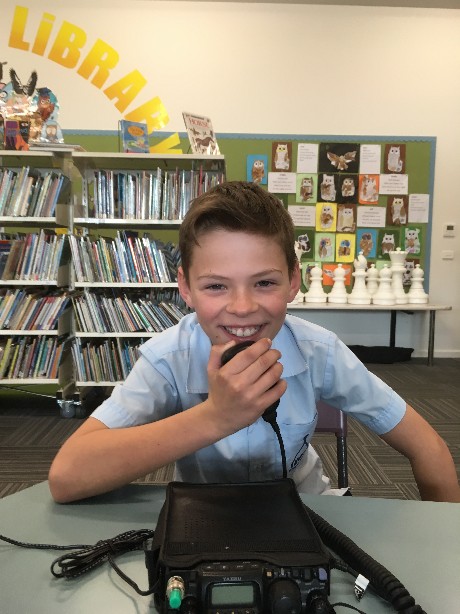
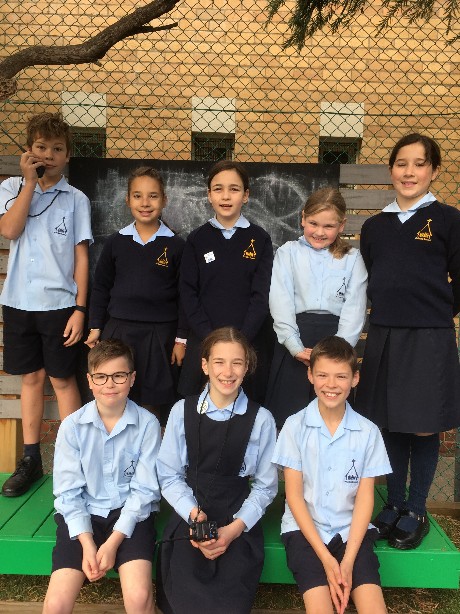
Here's some of the year 3/4 School Amateur Radio Club group at St. Kevin's Primary School. It is a big group this year and there is lots to do. The gang is usually on the air at lunchtime on Thursdays (7100kHz LSB) typically looking for contacts with VK5 (South Australia) and VK7 (Tasmania). Their call sign is VK3SRC. If you hear them on you really should give them a call. They would love to have a QSO (contact) with you.
They have got the Amateur Radio calling procedures down pat, but they could use some practice with the International Radio Alphabet and signal reports. When no one else is on the air, they use their practice sets to play their favourite game: Morse Code Battleships! If it isn't raining they will often go outside and use VHF/UHF FM hand-held radios to practice. All of this takes place under the close supervision of a licenced Amateur Radio operator of course.
SARCNET Computer Workshops @ Moorabbin and District Radio Club
It looks like junk to some, but not to students at the free, Tuesday night, SARCNET workshop at Moorabbin and District Radio Club: They know how to recycle computer parts and build their own working PCs for nothing! Their projects look more like a Frankenstein monster than a real PC, with bits and pieces from who knows where all stitched together, but that's half the fun. Free computer parts can often be scrounged from family and friends, schools and workplaces: “Please Sir, may I have more computer parts – it’s for my, my project?” You never know just what you’ll get, but you will soon become adept at swapping them around to build your own freaky creations. Students learn about what each component does, how to safely connect it and how to test it. Once all his parts are finally assembled on the laboratory table it is time to bring your Frankenstein PC to life. Apply a jolt of power and wait to see if his fans start beating, his eyes blink and if, at last, he beeps. It's alive! It's alive! Now take a journey through his innards by accessing his Basic Input Output System (BIOS) to find out what his brain is made of and if he has any memory. You can set his body clock and explore all of his peripherals: Of course, some may be rejected and will have to be replaced. Now it is time to give him a real personality. There are literally dozens to choose from. Download a free operating system and boot him up with it. Don’t like it? Just try another. You will have to give him a name and a password so only you can command him. You can even personalise him with bizarre colour schemes of your own. Tell him that one day you might even give him a nice case, but for now he is your personal experiment!
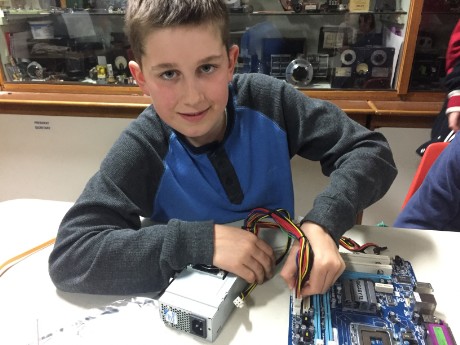
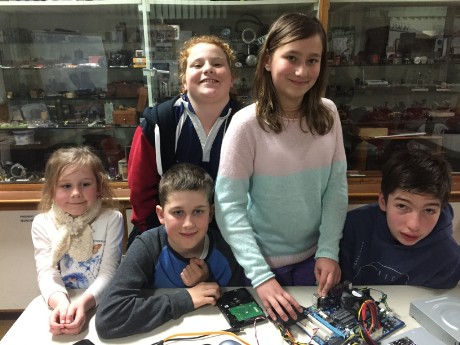
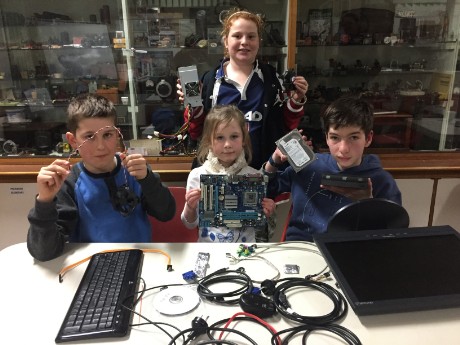
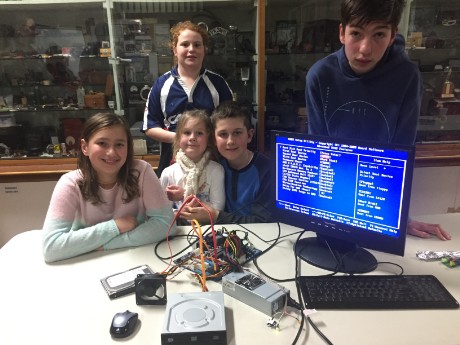
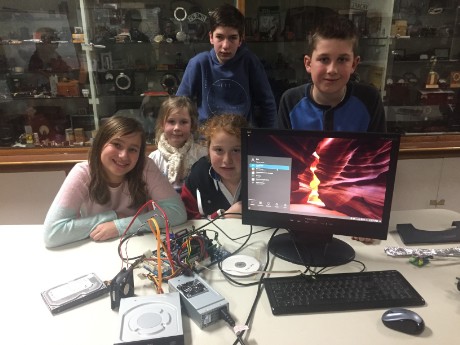
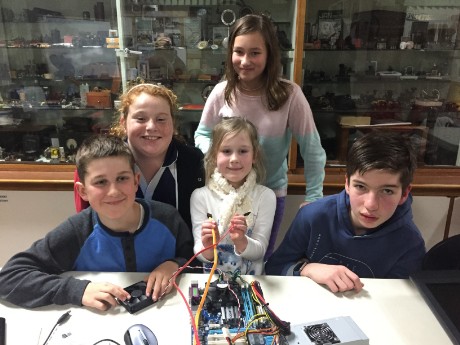
SARCNET Soldering Workshops @ Moorabbin and District Radio Club
SARCNET provides free Soldering workshops for kids at Moorabbin and District Radio Club on Tuesday nights. Emilka is working on a Surface Mount Device (SMD) electronic roulette wheel. Siblings Matthew, Jessica and Abigail (4yo) have mastered soldering SMDs using their SMD practice boards. Edward, who is practicing Plated Through Hole (PTH) soldering, already builds his own Printed Circuit Board (PCB) electronics kits.
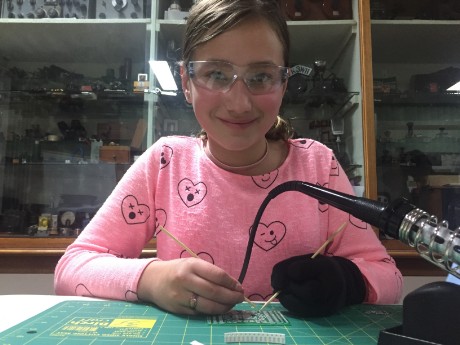
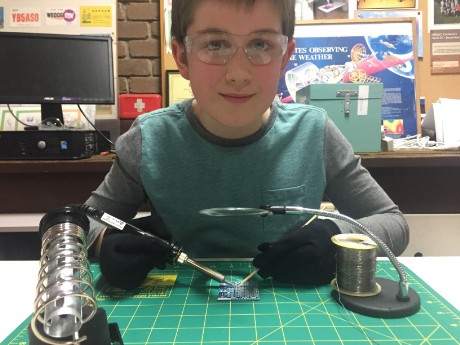
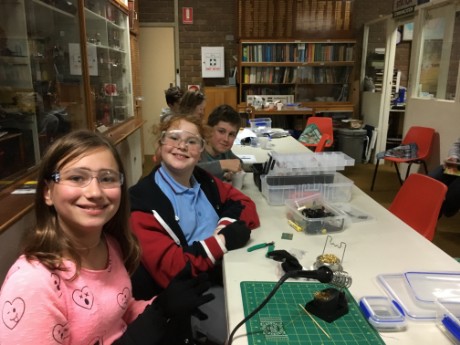
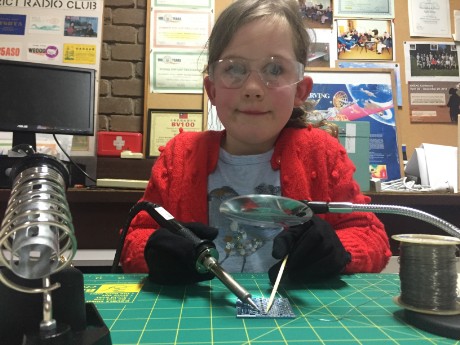
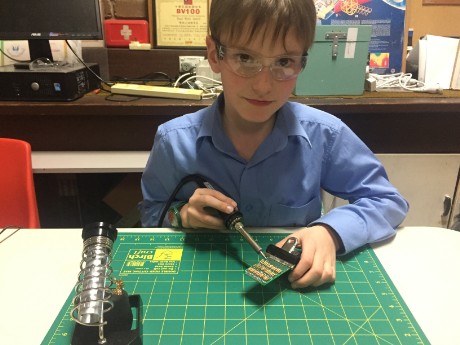
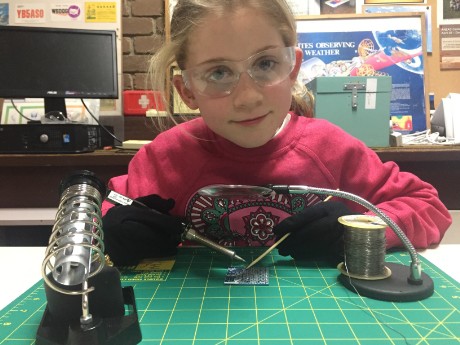
Well, soldering tiny electronic Surface Mount Devices (SMDs) might seem daunting at first, but it turns out to be a piece of cake, once you've got the hang of it... So, after completing the assembly of their own SMD practice boards, the students at the Tuesday Night SARCNET@MDRC Workshops move on to the more challenging task of using a Hot-Air SMD Rework Station. Operating at 350 degrees Celsius, these temperature-controlled hot-air wands are certainly hot enough to curl anyone's hair! But in skilled hands they make quick work of de-soldering even the largest SMD integrated circuits. The trick is to pre-heat both the front and rear of the PCB before concentrating the air stream on the IC pins themselves. Here, Jamie is harvesting dozens of pre-loved SMD components from a multilayer Printed Circuit Board. She will most likely re-use the parts in her future electronics projects. Below, Ethan and Kyle are working on their own board. It requires a steady hand on the tweezers and the ability to recognize the sound of the air stream when it's at the correct distance from the board. Emilka is using a Solder Sucker to refurbish her PTH prototyping board. She found that it is quicker than using solder-wick for double-sided PTH boards, but said it requires a bit of practice to get the timing just right. Everyone seems to have something interesting to do, tonight. There is no doubt that these young electronics enthusiasts can master any task.
